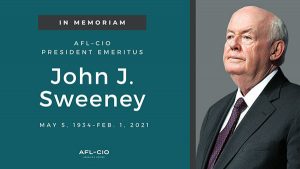AFL-CIO President Emeritus John J. Sweeney dies at 86
 By PAI and
By PAI and
the LABOR TRIBUNE
Washington — John J. Sweeney, who, as AFL-CIO President from 1995-2009 helped push Organized Labor’s focus out of congressional suites and into the nation’s streets – changing the federation’s structure as well – died Feb. 1, his successor, AFL-CIO President Richard Trumka, announced. Sweeney was 86.
“John Sweeney was a legend, plain and simple. He was guided into unionism by his Catholic faith, and not a single day passed by when he didn’t put the needs of working people first,” Trumka said in a statement.
“John viewed his leadership as a spiritual calling, a divine act of solidarity in a world plagued by distance and division. The son of Irish immigrants, he used work as a way to apply his values, consistently exhibiting grit over flash and pursuing progress instead of posturing.
“He built SEIU (the Service Employees) into a powerhouse, doubling its membership, earning respect across the Labor Movement and in the halls of power. Throughout his storied life, John used the lessons he learned as a
ground-level union leader to uphold dignity for all working people and expand human rights worldwide,” Trumka said.
A LASTING IMPACT
“John Sweeney believed in a Labor Movement that included everyone,” SEIU International President Mary Kay Henry said. “He put action behind those beliefs, making it his life’s mission to build a more inclusive union. His commitment to organizing helped pave the way to building SEIU into the two million-strong union of service and care workers that it is today. John’s leadership made a lasting impact on all working people through his generosity and willingness to take risks…. John was equal parts generosity and fearlessness, and the Labor Movement is better for it.”
A RETURN TO ACTIVISM
Sweeney and Trumka ran for the AFL-CIO’s top two jobs on an insurgent ticket at the federation’s convention in 1995 in New York, along with Linda Chavez-Thompson, who ran for executive secretary-treasurer. They won easily and Chavez-Thompson became the AFL-CIO’s first-ever executive vice president, as well as the first Latina and first person of color to hold a top AFL-CIO-wide elected post.
On Sweeney’s watch, the AFL-CIO turned more towards activism in the streets, alliances with other progressive organizations, rather than going it alone. Many of those alliances continue, and others have been created under Trumka.
After expanding the Executive Council to include more women and people of color, Sweeney shook up the AFL-CIO headquarters itself. He invigorated the Organizing Department, turning it into a “train the trainers” operation, whose graduates return to their home unions and train local members in the latest organizing techniques. And he sent union members into the streets, and often led marches himself.
He pushed the AFL-CIO to campaign hard for raising the minimum wage, workers’ rights and expanding health care coverage, but did not advocate policies then far out of the mainstream, such as Medicare For All. Now, Labor backs that as an option.
Sweeney’s progressive activism helped slow, but couldn’t stop, the steep slide in Organized Labor membership that began President Ronald Reagan’s summary firing of the nation’s 14,000 unionized PATCO air traffic controllers in summer of 1981.
In a 2006 speech at the National Press Club, Sweeney described the larger perils workers, unions and their leaders must contend with: “A corporate-driven strategy to compete in the global marketplace by degrading work and workers…competing through privatization, deregulation and de-unionization.”
‘HE UNDERSTOOD THE POSSIBILITIES OF OUR NATION’
News of Sweeney’s death drew statements of remembrance and praise from across the Labor Movement, the halls of Congress and the White House and the halls of government.
“I had the honor and privilege of working closely with John Sweeney during his leadership of the AFL-CIO,” said President Joe Biden. “Time and again over the many years of our friendship, I saw how lifting up the rights, voices, and dignity of working Americans was more than a job to him. It was a sacred mission. It was a calling.
“The son of a maid and a bus driver from Ireland, John grew up attending union meetings alongside his father. By the time he punched his own union card, America’s faith in unions was too often undermined. But John’s own faith in God sustained him with a value set and the conviction—to never lose sight of the truth that the middle class built America, and that unions built the middle class.
“The work he led, from the factory floors of the garment workers early in his career to the highest corridors of power as a national Labor leader, embodied the vital role that unions play in delivering greater wages and benefits for working people — union and nonunion alike. With every legislative push and tough Labor negotiation, he understood the possibilities of our nation when everyday Americans who do extraordinary things are treated with the dignity and respect they deserve.
“Jill and I count ourselves among the millions of Americans who will always be grateful for the progress John won, the example he set, and the legacy he has left to our nation. Our prayers are with John’s wife, Maureen, with their children, Trish and John Jr., and with his granddaughter, Kennedy. May God bless John Sweeney, a giant of the American Labor Movement, and a good man.”


Leave a Reply